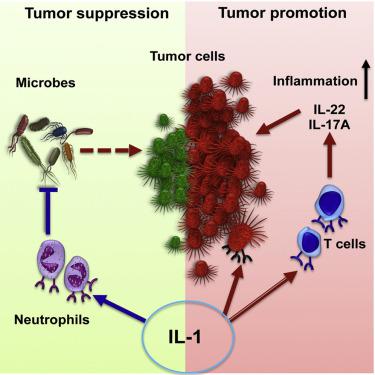Our official English website, www.x-mol.net, welcomes your feedback! (Note: you will need to create a separate account there.)
Cell-Type-Specific Responses to Interleukin-1 Control Microbial Invasion and Tumor-Elicited Inflammation in Colorectal Cancer.
Immunity ( IF 32.4 ) Pub Date : 2019-01-15 , DOI: 10.1016/j.immuni.2018.11.015 Oxana Dmitrieva-Posocco 1 , Amiran Dzutsev 2 , David F Posocco 3 , Vivianty Hou 3 , Wuxing Yuan 2 , Vishal Thovarai 4 , Ilgiz A Mufazalov 5 , Matthias Gunzer 6 , Igor P Shilovskiy 7 , Musa R Khaitov 7 , Giorgio Trinchieri 2 , Ari Waisman 5 , Sergei I Grivennikov 3
Immunity ( IF 32.4 ) Pub Date : 2019-01-15 , DOI: 10.1016/j.immuni.2018.11.015 Oxana Dmitrieva-Posocco 1 , Amiran Dzutsev 2 , David F Posocco 3 , Vivianty Hou 3 , Wuxing Yuan 2 , Vishal Thovarai 4 , Ilgiz A Mufazalov 5 , Matthias Gunzer 6 , Igor P Shilovskiy 7 , Musa R Khaitov 7 , Giorgio Trinchieri 2 , Ari Waisman 5 , Sergei I Grivennikov 3
Affiliation

|
Chronic inflammation drives the progression of colorectal cancer (CRC). Increased expression of interleukin (IL)-17A is associated with poor prognosis, and IL-17A blockade curbs tumor progression in preclinical models of CRC. Here we examined the impact of IL-1 signaling, a key regulator of the IL-17 pathway, in different cell types within the CRC microenvironment. Genetic deletion of the IL-1 receptor (IL-1R1) in epithelial cells alleviated tumorigenesis in the APC model of CRC, demonstrating a cell-autonomous role for IL-1 signaling in early tumor seed outgrowth. T cell specific ablation of IL-1R1 decreased tumor-elicited inflammation dependent on IL-17 and IL-22, thereby reducing CRC progression. The pro-tumorigenic roles of IL-1 were counteracted by its effects on myeloid cells, particularly neutrophils, where IL-1R1 ablation resulted in bacterial invasion into tumors, heightened inflammation and aggressive CRC progression. Thus, IL-1 signaling elicits cell-type-specific responses, which, in aggregate, set the inflammatory tone of the tumor microenvironment and determine the propensity for disease progression.
中文翻译:

对白细胞介素 1 的细胞类型特异性反应控制结肠直肠癌中的微生物侵袭和肿瘤引发的炎症。
慢性炎症推动结直肠癌 (CRC) 的进展。白细胞介素 (IL)-17A 表达增加与预后不良有关,IL-17A 阻断可抑制 CRC 临床前模型中的肿瘤进展。在这里,我们检查了 IL-1 信号传导(IL-17 通路的关键调节因子)在 CRC 微环境中不同细胞类型中的影响。上皮细胞中 IL-1 受体 (IL-1R1) 的基因缺失减轻了 CRC 的 APC 模型中的肿瘤发生,证明了 IL-1 信号在早期肿瘤种子生长中的细胞自主作用。IL-1R1 的 T 细胞特异性消融减少了依赖于 IL-17 和 IL-22 的肿瘤引发的炎症,从而减少了 CRC 进展。IL-1 的促肿瘤作用被其对骨髓细胞,特别是中性粒细胞的影响所抵消,其中 IL-1R1 消融导致细菌侵入肿瘤,加剧炎症和侵袭性 CRC 进展。因此,IL-1 信号会引发细胞类型特异性反应,这些反应总体上决定了肿瘤微环境的炎症基调并决定了疾病进展的倾向。
更新日期:2019-01-15
中文翻译:

对白细胞介素 1 的细胞类型特异性反应控制结肠直肠癌中的微生物侵袭和肿瘤引发的炎症。
慢性炎症推动结直肠癌 (CRC) 的进展。白细胞介素 (IL)-17A 表达增加与预后不良有关,IL-17A 阻断可抑制 CRC 临床前模型中的肿瘤进展。在这里,我们检查了 IL-1 信号传导(IL-17 通路的关键调节因子)在 CRC 微环境中不同细胞类型中的影响。上皮细胞中 IL-1 受体 (IL-1R1) 的基因缺失减轻了 CRC 的 APC 模型中的肿瘤发生,证明了 IL-1 信号在早期肿瘤种子生长中的细胞自主作用。IL-1R1 的 T 细胞特异性消融减少了依赖于 IL-17 和 IL-22 的肿瘤引发的炎症,从而减少了 CRC 进展。IL-1 的促肿瘤作用被其对骨髓细胞,特别是中性粒细胞的影响所抵消,其中 IL-1R1 消融导致细菌侵入肿瘤,加剧炎症和侵袭性 CRC 进展。因此,IL-1 信号会引发细胞类型特异性反应,这些反应总体上决定了肿瘤微环境的炎症基调并决定了疾病进展的倾向。


























 京公网安备 11010802027423号
京公网安备 11010802027423号